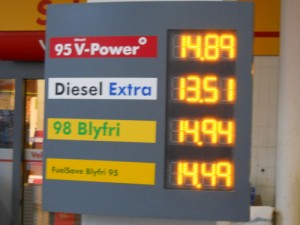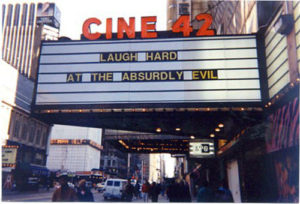Flush times! Economy fully recovered, unemployment down, jobs finally on the rise, housing crisis over, all wars sort of mostly concluded, Wall Street shamelessly gorging, racial tensions aflame, wealth more unevenly divided than ever, consumer spending up, that awful socialist Obama obviously hurling us deeper and deeper into a hellpit of, uh, shocking stability and (messy, flawed, still sort of miraculous) success.
And wow, those gas prices! Well below $3 a gallon in most areas, and dropping fast. For a variety of reasons – Libya, OPEC, record-high US production (thanks again, hippie Obama, for encouraging so much new domestic oil output) – oil is right now so amazingly cheap as to be, well, sort of disastrous.
Is it not true? Let’s just say it outright: There is nothing good about cheap gas in America. All the wrong corporations ultimately benefit: big oil (shares dip, but influence surges), big auto, plastic manufacturers, the same heartless PTB that have lorded over the American economy since just about forever. Worse, all the right ideas – alternative energy, efficiency, conservation, the environment, the general social good – get re-shunned and scoffed at anew.

Car fanatics have long argued that cheap gas and the internal combustion engine are essential to America’s car culture. Tesla and this here BMW i8 (Top Gear’s Car of the Year) have shut them up.
Automakers are, naturally, thrilled by tumbling oil prices. Cheap gas means not only are people driving more, it means fickle, short-term memory Americans are buying gas-guzzling SUVs and large trucks all over again (at a far higher profit margin for the automakers), and the pressure to produce really good small, efficient cars slackens – at least until 2025 (damn you yet again, Obama. Such a mixed blessing you are).
It’s a shame, really. Such a positive direction we were heading! Such constructive changes were afoot when oil was double or triple its current price! And, let’s be fair – compared to Europe and most of the developed world, we’ve never paid much for gas (Currently in Japan: $6/gallon; Turkey: $8/gallon; Italy: $9.50/gallon; Norway pays more than $10 a gallon, and they’re one of the happiest nations on Earth). Even at $4/gallon, we get a downright bargain. We pay more for bottled water.
Do not misunderstand. When oil prices peaked in 2008, changing our car-obsessed culture was no fun, at first, especially during a recession. But we quickly got used to it, and we did what we always do in times of scarcity: We adapt. We change our wasteful behaviors. We pay more attention to how we (quite literally) move through the world. We get less lazy and more creative, plan more carefully, choose our travels more diligently, figured out what’s really important.
In other words, when gas prices skyrocket, we adapt in all the right ways: Drive less, ride-share more, telecommute, walk to work, get out of our cars and back into the more connected social flow. Alternative transportation (bikes, buses, trains) gain tremendous support. People begin to think differently, for the better.
Communities benefit, too. I remember plenty of stories, circa mid-2008 when oil prices were peaking, about people shopping more locally and patronizing small businesses again, as “Free shipping!” disappeared from e-commerce and lazily ordering your every rubber band ball and toothbrush on Amazon wasn’t quite the slothful steal it once was.
And of course, high gas prices meant automakers were forced out of their creative stupors, spurred into finally designing truly desirable, efficient small cars – which many actually did. Not to mention the advent of Tesla, the BMW i Series, et al.

Low-speed rail! SF could spiff up its classic Italian Muni cars, add plush seats and Wifi and pour-over coffee, and who needs to drive to work?
Of course, this current low-price blip will not, cannot last. Oil prices are not merely seasonal, viciously political and globally unpredictable, they are environmentally unsustainable. More so than ever.
California alone is on track to hit 50 million residents by 2049 (currently 38m), which means millions more cars and a massive strain on the already congested highway system. High-speed rail might help, if it ever gets built, but will do exactly zero to alleviate regional travel (though of course, the California drought my be a far larger game changer than oil).
And what about that huge, 50% increase in US oil production? Obama has, quite weirdly, become the “oil president,” and much of the surge in US output of it is the result of fracking in Texas and North Dakota; fracking, of course, being one of the most environmentally harmful, water-intensive extraction practice we know, next to the frightening techniques required to suck bitumen from tar sands up in Canada. Can we keep fracking endlessly? Do we have any idea how dangerous it might actually be, down the road? Shall we ask Mother Nature?

High-speed rail! If we don’t at least try is, CA is certainly screwed. 50 million residents by 2049 will see to that (if the drought doesn’t get us first)
Meanwhile, some suggest now would be a great time to increase the gas tax – which hasn’t been touched in 20 years – by 15 cents or so, primarily to help the fiscally broke Highway Trust Fund.
But here’s even more awesomely helpful and radical idea: a five dollar per gallon tax increase – hell make it $6 – all of it earmarked for alternative energy and transport, environmental protections, our busted educational system, our multi-trillion debt.
Can you imagine? The dramatic upheaval? The wild spurts of innovation? The furious new trends toward super efficiency? More public transport. Less sprawl. More efficient verticality. Local businesses flourish. Improved air quality. Electric mopeds and bikes and Harley Davidson LiveWires for all. And, as Telsa and BMW have already proved, “car culture” could adapt brilliantly. What’s not to like?
Bonus: Less foreign oil. No Libya, Venezuela, Iraq, Saudi Arabia. A staggering cultural and political cataclysm in one fell and easy swoop.
Could it happen? Or course not – not via insane/brilliant tax hike, anyway. Few politicians have the nerve to propose even the 15 cent idea, much less push a $5 tax though an oil-soaked, Exxon-beloved Republican congress.
But Mother Nature? As always, all bets are off. And like it or not, she fixes everything, eventually.
Read more here:: $2 gas is the worse thing to happen to America



